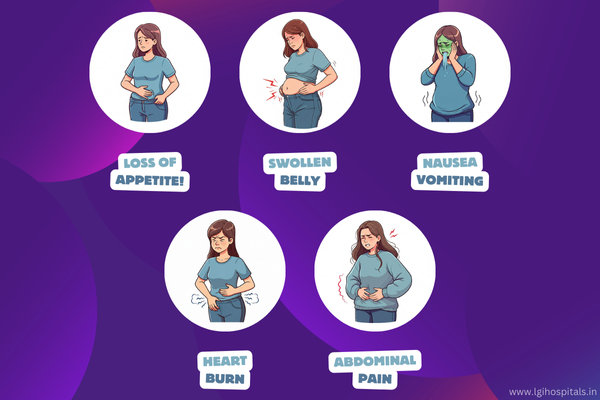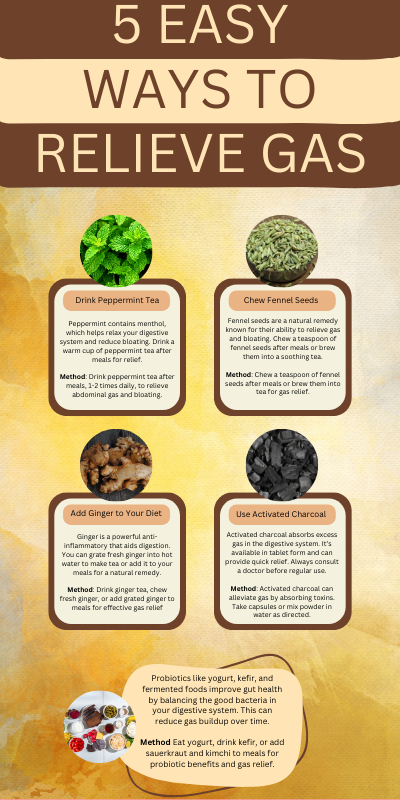Abdominal gas is a common problem. It’s a natural part of digestion, but too much gas can cause bloating, pain, and discomfort. The good news is that there are simple, natural ways to get relief. This guide will help you understand the causes, symptoms, and remedies for gas relief, along with when to seek professional help.
What Causes Abdominal Gas?
Gas forms in your stomach when food breaks down or you swallow air. Common reasons include:
Eating too fast or talking while eating.
Foods like beans, lentils, cabbage, and fizzy drinks.
Digestive problems like lactose intolerance, irritable bowel syndrome (IBS), or food intolerance.
Certain habits, like chewing gum or drinking through a straw, can also introduce extra air into your stomach. Knowing the causes can help you take steps to reduce gas buildup and improve digestion.
What Is Excessive Gas Sign:
While occasional gas is normal, excessive gas can sometimes be a sign of an underlying condition. Here are some possibilities:
1. Lactose Intolerance: People with lactose intolerance cannot digest lactose, a sugar found in dairy products, leading to gas and bloating. Know more about lactose intolerance
2. Irritable Bowel Syndrome (IBS): This common digestive disorder can cause excessive gas, along with symptoms like cramping, diarrhea, or constipation.
3. Small Intestinal Bacterial Overgrowth (SIBO): An overgrowth of bacteria in the small intestine can produce excess gas and lead to bloating and discomfort.
4. Celiac Disease: This autoimmune disorder, triggered by gluten, can cause gas, diarrhea, and other digestive symptoms.
5. Gastrointestinal Infections: Bacterial, viral, or parasitic infections in the digestive tract can result in excessive gas as a symptom.
6. Pancreatic Insufficiency: If the pancreas doesn’t produce enough digestive enzymes, it can lead to poor digestion and excessive gas.
Note If excessive gas is persistent or accompanied by severe symptoms like weight loss, blood in stool, or severe pain, it’s important to seek medical advice.
Symptoms of Excess Gas

Frequent burping.
Feeling bloated or full.
Passing gas more often than usual.
Stomach pain that moves around your abdomen.
Occasionally, gas may cause sharp pains that mimic other conditions like heartburn or even gallbladder issues. If symptoms persist or worsen, it’s important to consult a healthcare provider.
10 Natural Remedies to Relieve Abdominal Gas

Natural remedies are a safe and effective way to manage abdominal gas and bloating. Here are ten proven methods:
1. Drink Peppermint Tea
Peppermint contains menthol, which helps relax your digestive system and reduce bloating. Drink a warm cup of peppermint tea after meals for relief.
2. Chew Fennel Seeds
Fennel seeds are a natural remedy known for their ability to relieve gas and bloating. Chew a teaspoon of fennel seeds after meals or brew them into a soothing tea.
3. Add Ginger to Your Diet
Ginger is a powerful anti-inflammatory that aids digestion. You can grate fresh ginger into hot water to make tea or add it to your meals for a natural remedy.
4. Use Activated Charcoal
Activated charcoal absorbs excess gas in the digestive system. It’s available in tablet form and can provide quick relief. Always consult a doctor before regular use.
5. Drink Plenty of Water
Staying hydrated helps flush out excess gas and prevents constipation, which can make bloating worse. Aim to drink 810 glasses of water a day.
6. Avoid Fizzy Drinks
Carbonated beverages like soda and sparkling water introduce extra gas into your stomach. Choose still water or herbal teas instead.
7. Eat Probiotic Foods
Probiotics like yogurt, kefir, and fermented foods improve gut health by balancing the good bacteria in your digestive system. This can reduce gas buildup over time.
8. Eat Slowly
Eating too quickly can cause you to swallow extra air, leading to gas. Take your time, chew your food thoroughly, and avoid talking while eating.
9. Use a Warm Compress
A warm compress on your abdomen can relax your muscles and promote the release of trapped gas. This is especially helpful if you’re experiencing cramping or pain.
10. Try Yoga Poses
Yoga poses like Pavanamuktasana (WindRelieving Pose) and Child’s Pose can help release trapped gas. Practicing yoga regularly can also improve overall digestion.

Additional Tips for Preventing Gas
In addition to these remedies, you can take preventive measures to avoid excessive gas:
Avoid overeating by eating smaller, more frequent meals.
Limit foods that are known to cause gas, such as beans, onions, and dairy products.
Include more fiber in your diet, but increase it gradually to avoid gas.
Stay active, as regular exercise helps your digestive system function more efficiently.
When to See a Doctor
While these remedies work for most people, there are times when you should seek medical advice. Persistent or severe symptoms could indicate an underlying issue like:
Food allergies or intolerances.
Irritable bowel syndrome (IBS).
Gastrointestinal infections or blockages.
If gas and bloating persist despite these remedies, consult the best gastroenterologists in Nagpur at LGI Hospital. Our experts provide personalized care to address your digestive health concerns. Use the form below to book an appointment today.
Abdominal gas can be uncomfortable and sometimes embarrassing, but simple lifestyle changes and natural remedies can help. By understanding what causes gas and trying these solutions, you can find relief and improve your digestive health. If the problem continues or worsens, don’t hesitate to seek professional medical advice from LGI Hospital. Relief is just an appointment away!

